BULIOK, Pikit, North Cotabato (MindaNews / 08 Feb) – Two-month old Myrhana Mangaguil was in deep slumber on the lap of her aunt, Hamira Abubacar who was resting on a shaded bench near the gate of the Buliok Elementary School shortly before 9 a.m. Wednesday. Hamira was waiting for Myrhana’s mother to finish voting in the plebiscite on the proposed inclusion of Buliok in the Bangsamoro Autonomous Region in Muslim Mindanao (BARMM).
Myrhana slept peacefully, unmindful of the noise from voters looking for their names on the lists posted on the wall nearby and those walking towards their voting precincts to decide on her future.
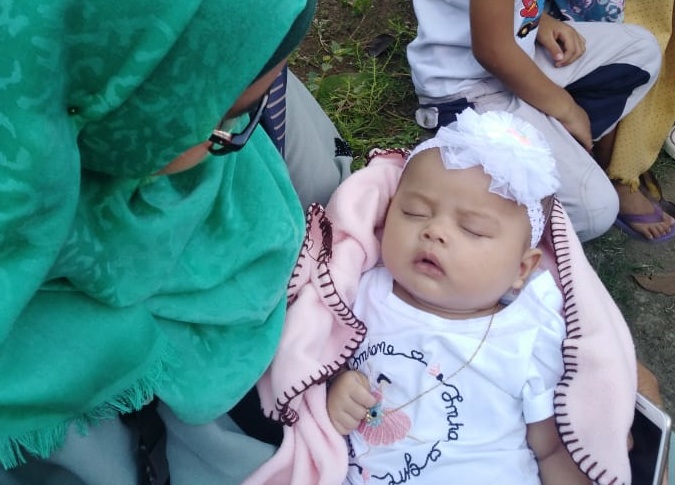 Two-month old Myrhana Mangaguil sleeps peacefully on the lap of her aunt, Hamira Abubacar at the Buliok Elementary School in Pikit, North Cotabato, shortly before 9 a.m. on plebiscite day, 06 February 2019. Abubacar says her vote to the inclusion of Barangay Buliok in the Bangsamoro Autonomous Region in Muslim Mindanao is for Myrhana, that she may grow up not experiencing war and displacement. MindaNews photo by CAROLYN O. ARGUILLAS
Two-month old Myrhana Mangaguil sleeps peacefully on the lap of her aunt, Hamira Abubacar at the Buliok Elementary School in Pikit, North Cotabato, shortly before 9 a.m. on plebiscite day, 06 February 2019. Abubacar says her vote to the inclusion of Barangay Buliok in the Bangsamoro Autonomous Region in Muslim Mindanao is for Myrhana, that she may grow up not experiencing war and displacement. MindaNews photo by CAROLYN O. ARGUILLAS
“Insha Allah si Myrhana hindi na magbakwit,” said the 33-year old Hamira, who, like thousands of residents in war-torn villages like hers, can no longer recall how many times she has had to evacuate in their lifetime. “Di ko na matandaan. Ilang beses na.”
Unable to graduate from high school because wars disrupted classes and yes, their livelihood, Hamira worked as domestic helper in Kuwait and later Oman, for ten years.
She came home three months ago and has decided to stay home because “Insha Allah, may Bangsamoro na” (We now have a Bangsamoro).
“Wala nang gyera. Kapayapaan na. (War is over. It’s peace now), said Hamira.
Hamira’s narrative of wars and displacements in her Barangay Buliok, and hope in the coming of the Bangsamoro government, is shared by many in the voting precincts also visited by MindaNews on plebiscite day — in Rahaj Muda, Bagoinged, Barungis, Kabasalan and Bulol.
In Kabasalan Elementary School, housewife Normina Subpingan, 34, voted “yes” to assure the future of her eight children.
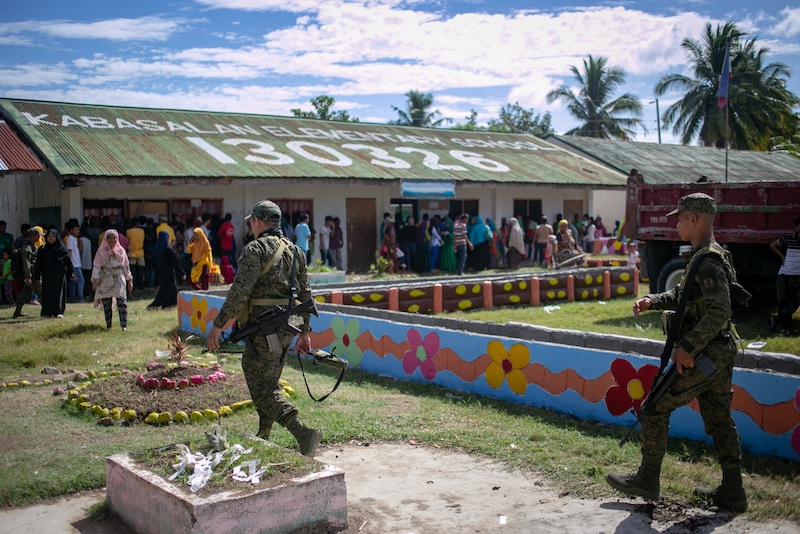 Soldiers secure the Kabasalan Elemenraty School, a polling center in Barangay Kabasalan, Pikit, North Cotabato on 6 February 2019, plebiscite day on the proposed inclusion of their village in the Bangsamoro Autonomous Region in Muslim Mindanao. MindaNews photo by MANMAN DEJETO
Soldiers secure the Kabasalan Elemenraty School, a polling center in Barangay Kabasalan, Pikit, North Cotabato on 6 February 2019, plebiscite day on the proposed inclusion of their village in the Bangsamoro Autonomous Region in Muslim Mindanao. MindaNews photo by MANMAN DEJETO
Normina believes joining the BARMM will mean her children will live in peace and will be able to finish school. Like Hamira, she cannot say how many times she has had to flee from war. Even her children have had to flee “mga limang beses” (around five times).
Normina said the cycle of evacuations hampered her studies, making her complete only her Elementary years. Her eldest is now in high school and she dreams all her children will be able to finish school, uninterrupted by wars.
In Barangay Bagoinged’s elementary school, farmer Kirino Eslail, 75, father of eight and grandfather to 10, voted “yes” to each of the 23 questions Pikit’s voters had to answer on the biggest ballot among all areas where the plebiscite on the BARMM was conducted on January 21 and February 6.
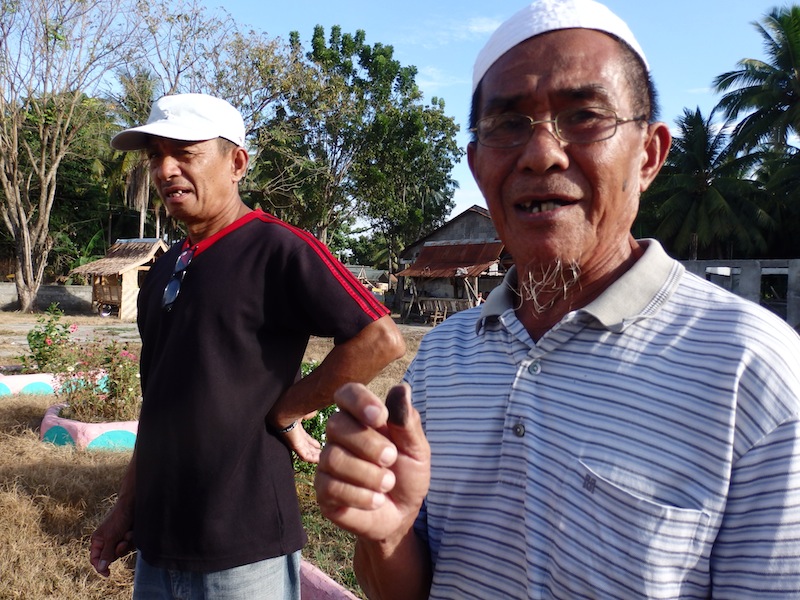 “Kalilintad,” the Maguindanaon word for “peace,” is 75-year old farmer Kirino Eslail’s answer when asked what his “yes” vote means. Eslail voted “yes” to the proposed inclusion of Barangay Bagoinged in Pikit, North Cotabato, in the Bangsamoro Autonomous Region in Muslim Mindanao (BARMM) during the plebiscite on February 6, 2019. MindaNews photo by CAROLYN O. ARGUILLAS
“Kalilintad,” the Maguindanaon word for “peace,” is 75-year old farmer Kirino Eslail’s answer when asked what his “yes” vote means. Eslail voted “yes” to the proposed inclusion of Barangay Bagoinged in Pikit, North Cotabato, in the Bangsamoro Autonomous Region in Muslim Mindanao (BARMM) during the plebiscite on February 6, 2019. MindaNews photo by CAROLYN O. ARGUILLAS
“Kalilintad” (Peace), the farmer replied when asked what his vote signified. “Madakl” (Several times) was his response when asked how many times he has had to flee from war in the last 50 years.
Twenty-three out of 42 barangays in Pikit – including these former battlegrounds of the Moro liberation fronts (Moro National Liberation Front and later the Moro Islamic Liberation Front) and government forces — were proposed for inclusion in the BARMM.
Twenty-two out of the 23 will be joining the BARMM, based on results from the Municipal Plebiscite Board of Canvassers. Barangay Balatican voted “no” but Commissioner Omar Sema of the Bangsamoro Transition Commission manifested before the Board on Thursday that they would file a petition for a declaration of failure of plebiscite in Balatican where he said “no free election” was conducted due to threats and intimidation.
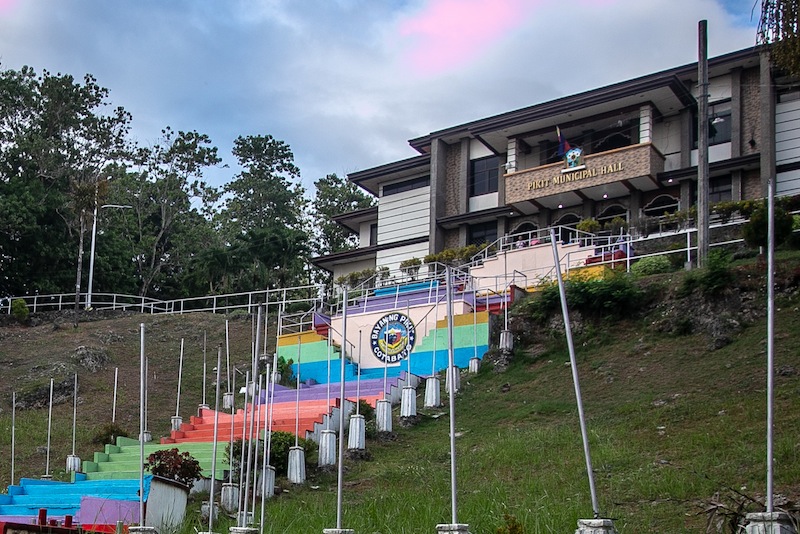 The municipal hall of Pikit in North Cotabato, is part of Barangay Fort Pikit which is one of 22 barangays whose proposed inclusion in the Bangsamoro Autonomous Region in Muslim Mindanao (BARMM) has been approved by majority of the voters in the town. Only 20 of Pikit’s 42 barangays will remain with North Cotabato. Mayor Sultan Sumulong says they will file a petition to have the municipal hall and the plaza be included in Barangay Poblacion instead, to allow what remains of Pikit to retain its town hall. MindaNews photo by MANMAN DEJETO
The municipal hall of Pikit in North Cotabato, is part of Barangay Fort Pikit which is one of 22 barangays whose proposed inclusion in the Bangsamoro Autonomous Region in Muslim Mindanao (BARMM) has been approved by majority of the voters in the town. Only 20 of Pikit’s 42 barangays will remain with North Cotabato. Mayor Sultan Sumulong says they will file a petition to have the municipal hall and the plaza be included in Barangay Poblacion instead, to allow what remains of Pikit to retain its town hall. MindaNews photo by MANMAN DEJETO
Of the 22 that will now join the BARMM, 11 had actually voted for inclusion in what was supposed to be an expanded Autonomous Region in Muslim Mindanao (ARMM) in the plebiscite on August 14, 2001 – among them Hamira’s Barangay Buliok, Kirino’s Bagoinged and Normina’s Kabasalan.
The Commission on Elections last month approved the petition of 12 other barangays in Pikit that petitioned for inclusion in the BARMM, among them Barungis, Bulol and Rajah Muda.
“Wala nang gyera”
For Hamida Sailon, 60, owner of a sari-sari store and a voter of Bagoinged, voting “yes” means “wala nang gyera” (war is over).
Her wish for her grandchildren is that their lives will no longer be disrupted by wars. “Hindi na sana magbakwit at sana makapamuhay nang maayos” (They will no longer evacuate and their lives will be better). Like Hamira, Normina and Kirino, she cannot remember how many times she has had to flee from war, the evacuations ranging from a month to a year.
Bagoinged Barangay captain Faisal Haron, 67, voted “yes” because the many wars in his village and neighboring areas have destroyed so many lives (“maraming buhay nasira dito”).
He is optimistic that under the Bangsamoro, “doon namin makamit ang kapayapaan, umangat kabuhayan ng mga tao” (we will achieve peace and the lives of the people will improve). He hopes the Bangsamoro leadership will ensure the livelihood of residents and the improvement of their road as well.
At the Barungis Elementary School in Barangay Barungis, Dimacaling Alpong, 58, carried his grandddaugher Bai Linang, his 9th grandchild who is “almost one year old,” while waiting for his wife to finish voting. Bai Linang’s mother, Dimacaling said, is a teacher in the school and was busy with her election duties.
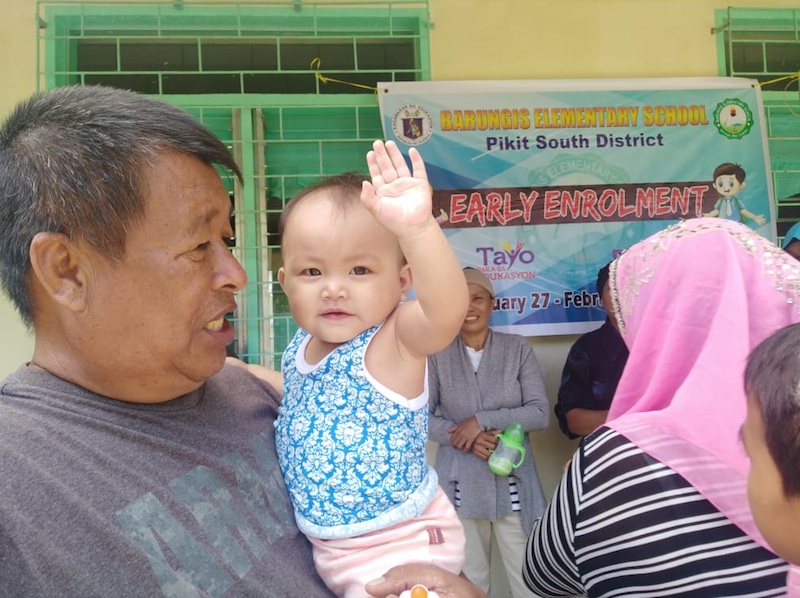 Dimacaling Alpong of Barangay Barungis in Pikit, North Cotabato carries his granddaughter Bai Linang while waiting for his wife to finish voting on plebiscite day, 06 February 2019. Dimacaling hopes her granddaughter will never experience war in her lifetime. MindaNews photo by CAROLYN O. ARGUILLAS
Dimacaling Alpong of Barangay Barungis in Pikit, North Cotabato carries his granddaughter Bai Linang while waiting for his wife to finish voting on plebiscite day, 06 February 2019. Dimacaling hopes her granddaughter will never experience war in her lifetime. MindaNews photo by CAROLYN O. ARGUILLAS
Dimacaling hopes Bai Linang will never experience war in her lifetime. “Kami na lang makaranas, huwag na sila” (We have experienced that. Spare them).
Gulam Guimbalanan, 52, barangay captain of Kabasalan, said being part of the BARMM will bring an end to wars and displacements.
“Wala nang gyera, wala nang bakwit” (No more war, no more evacuees), he said.
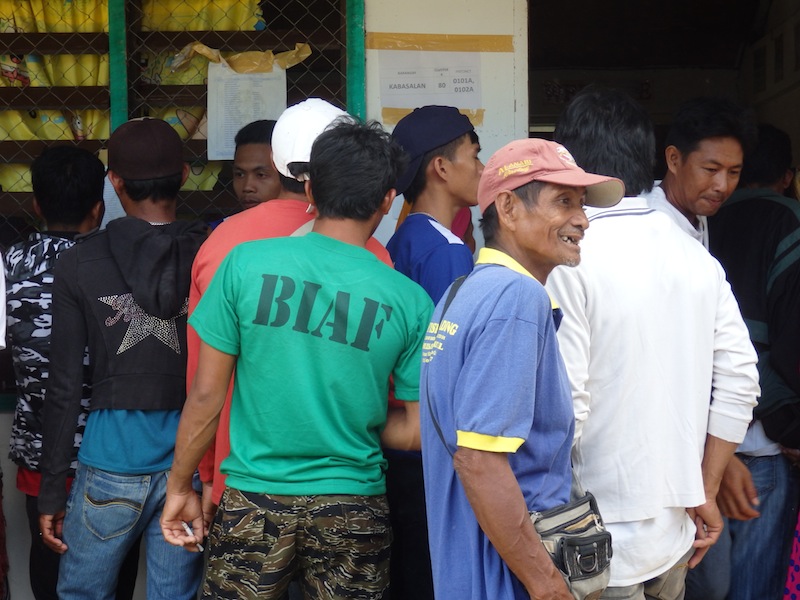 A member of the Bangsamoro Islamic Armed Forces, the soon-to-be-decommissioned armed wing of the Moro Islamic Liberation Front waits for his turn to check his name on the voters’ list outside a voting precinct in Kabasalan Elementary School in Barangay Kabasalan, Pikit, North Cotabato, on 06 February 2019. MindaNews photo by CAROLYN O. ARGUILLAS
A member of the Bangsamoro Islamic Armed Forces, the soon-to-be-decommissioned armed wing of the Moro Islamic Liberation Front waits for his turn to check his name on the voters’ list outside a voting precinct in Kabasalan Elementary School in Barangay Kabasalan, Pikit, North Cotabato, on 06 February 2019. MindaNews photo by CAROLYN O. ARGUILLAS
Hundreds of mujahideens – many of them first time voters – trooped to the polls in the villages often mentioned as the places of origins of residents who seek refuge in evacuation centers in the cycle of wars here.
Among them was their commander — Acmad Abas — more popularly known as Kumander Jack, head of the Eastern Mindanao Front based in the MILF’s Camp Rajah Muda, who was accorded special treatment (as MILF chair Al Haj Murad Ebrahim was on January 21 in Sultan Kudarat, Maguindanao) at his voting precinct in the Rajah Muda Elementary School.
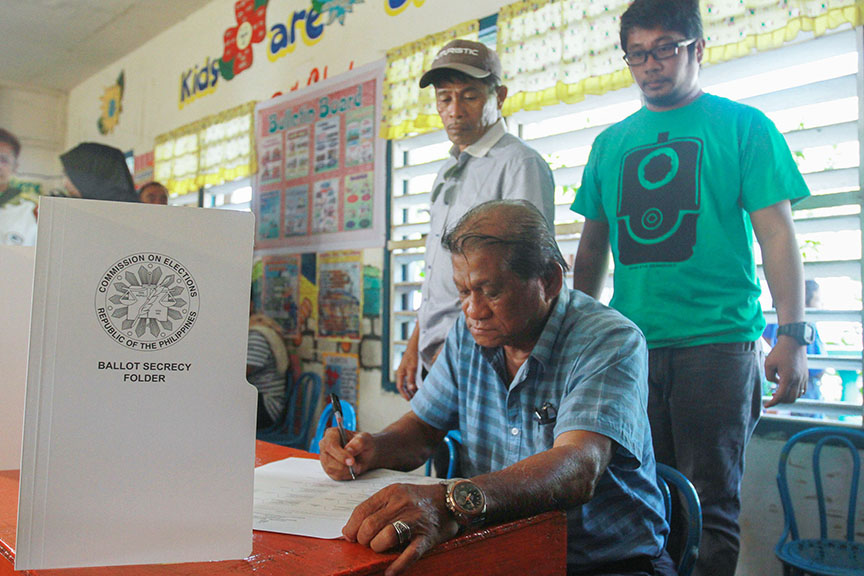 Moro Islamic Liberation Front (MILF) Eastern Mindanao Front commander Jack Abas casts his vote at Rajamuda Elementary School in Pikit, Cotabato Province on Wednesday (6 February 2019) during the plebiscite on the inclusion of 67 barangays in 7 towns in the province in the Bangsamoro Autonomous Region in Muslim Mindanao (BARMM). Mindanews photo
Moro Islamic Liberation Front (MILF) Eastern Mindanao Front commander Jack Abas casts his vote at Rajamuda Elementary School in Pikit, Cotabato Province on Wednesday (6 February 2019) during the plebiscite on the inclusion of 67 barangays in 7 towns in the province in the Bangsamoro Autonomous Region in Muslim Mindanao (BARMM). Mindanews photo
Teacher Mohanie Abas, a poll clerk in one of the clustered precincts near where the MILF commander voted, said more voters turned up at the plebiscite than in the barangay elections in May last year.
She also noted that voters “na may grudge” (referring to those involved in ‘rido’ or clan disputes), “nagkita sila harap-harapan, walang tension” (they saw each other face to face here but there was no tension).
“Yung may grudge nagkaisa sila dahil sa BOL (They were united for the Bangsamoro organic law), she said. (Carolyn O. Arguillas / MindaNews)
